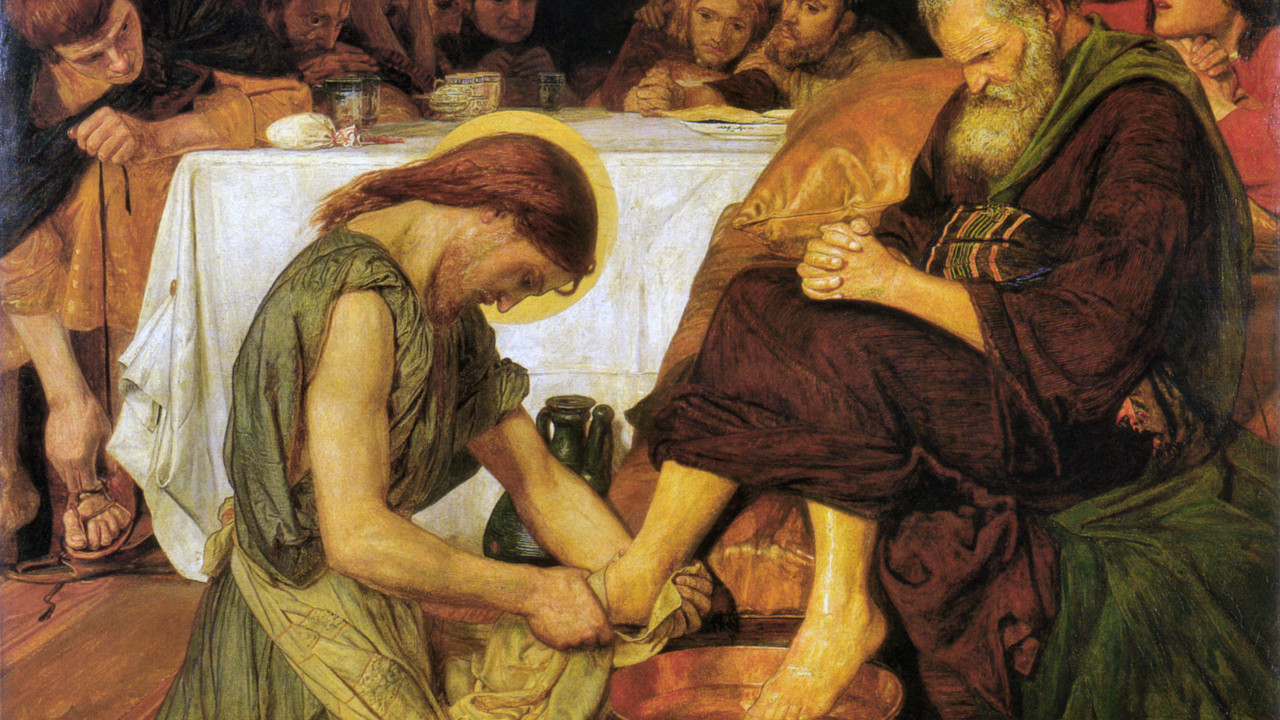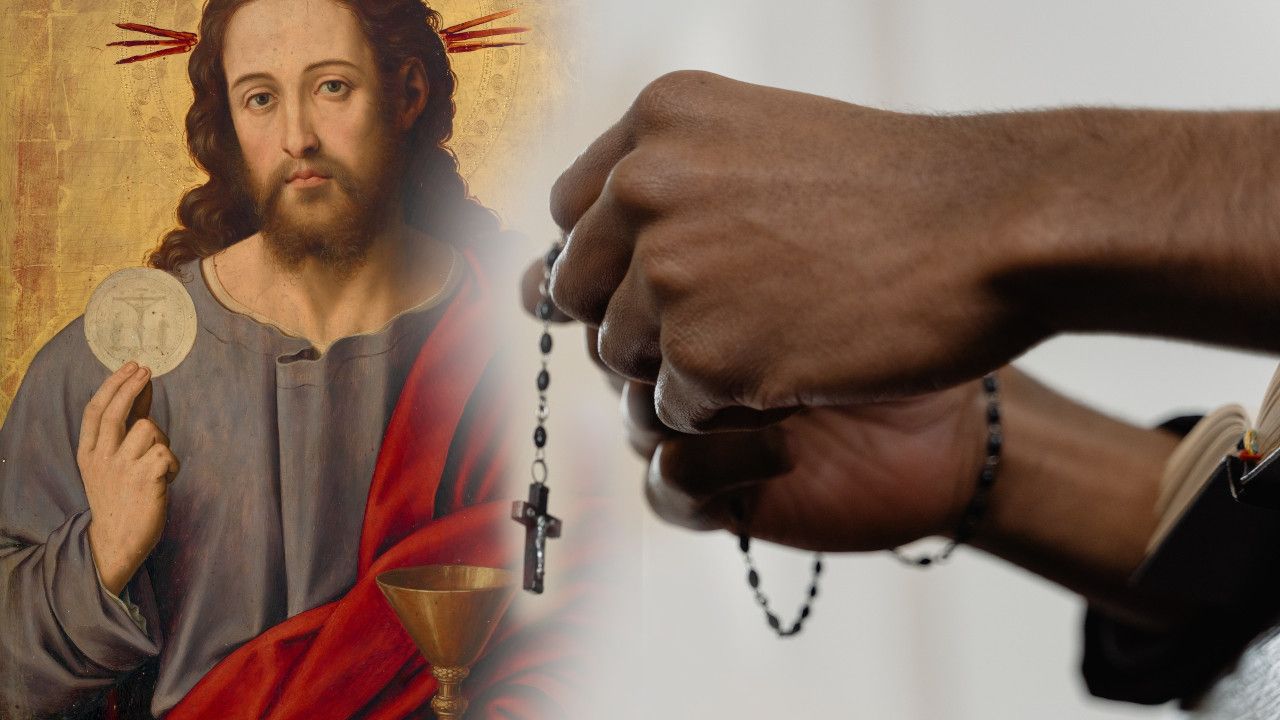Dear Souls and Hearts members,
In this series, Dr Gerry Crete explores a Christian approach to working with our parts using the Luminous Mysteries of the Rosary. Reflecting on these five Gospel accounts from the typological or allegorical sense rather than the literal sense, Jesus is seen as a “type” of the inmost self and the apostles and other characters are viewed as parts of the self-system, representing a tableau of our own inner world. Through this interpretive lens we may find new layers of insight into how we can more authentically love ourselves, others, and God in a more meaningful, Christ-like way.
I hope you enjoy this final installment in the series, and be sure to let Dr. Gerry know if you have feedback or questions at [email protected]. If you missed any of the previous messages in the series, please visit Souls and Hearts weekly reflections.
The Institution of the Eucharist: Illuminating Parts through the Luminous Mysteries
By Gerry Crete, Ph.D.
At the Last Supper, Jesus gathers his twelve apostles together for the formal beginning of the new covenant with the Institution of the Eucharist. These twelve men represent the twelve Jewish tribes of the old covenant and they witness Jesus inaugurating the Eucharistic liturgy of the new covenant:
Jesus took a loaf of bread, and after blessing it he broke it, gave it to the disciples, and said, “Take, eat; this is my body.” Then he took a cup, and after giving thanks he gave it to them, saying, “Drink from it, all of you; for this is my blood of the new covenant, which is poured out for many for the forgiveness of sins. I tell you, I will never again drink of this fruit of the vine until that day when I drink it new with you in my Father’s kingdom.” (Matthew 26:26-29)
Immediately after this tremendous gift is given to the apostles at the Last Supper, Jesus’ Passion begins – the crescendo of our Lord’s earthly mission to bring about the new kingdom.

There is so much to unpack here from a parts work perspective. Christ shares his inmost self with each apostle as the loaf of bread is his body, broken and shared. This sharing of himself is both spiritual and deeply somatic. The unity is at a molecular level! This consummation unites the inmost self of Christ with each and every part of the apostles’ self-systems. The wine, his blood, is the lifeforce of the body, pumped from the heart and flowing to every part of the body providing nourishment, energy, motivation, zest, and life.
Jesus’ self-gift in the Eucharist offers a new life that heals, rescues, forgives, and brings true freedom; the polar opposite of the kingdom of darkness.
Interior Intimacy
Before sharing the sacred meal, the apostles gather and Jesus washes their feet. This is an example of Jesus, in the role of the inmost self, caring for each and every part of the self-system, for each and every apostle. Peter expresses his disapproval, not wanting to be cared for, and Jesus gently insists on the importance of being served by him. We also have parts that resist being cared for, that resist being loved, that want to do it all on their own. We have parts that want to hide our dirty feet, and other disliked parts of us from being seen, touched, and cleansed.

As the Institution of the Eucharist draws near, we see John, the beloved apostle, reclining on Jesus’ chest. Here is an example of a beautiful intimacy between a part and the inmost self. John represents a part that is unblended and able to recline and relax, to be at peace and express intimacy. This part can experience authentic serenity within the context of this communion.
The symbolism of the Eucharist itself is that one bread is shared among many creating a bond of unity between all the parts. Additionally, the symbolic Passover meal signifies the beginning of a journey of liberation and transformation for the apostles and for each one of our parts. At the Last Supper, the apostles are clearly ‘works in progress,’ destined to be transformed later, following the resurrection at Pentecost when they receive the Holy Spirit. Yet in this moment of receiving the Eucharist, they accept our Lord with receptive hearts as they begin the next phase of their journey. When we receive communion, we can also understand it as the beginning of the next phase of our journey as our parts are renewed and strengthened to begin again.
Judas: Burdened Manager or Exile?
As the Last Supper commences, before the institution of the Eucharist, Jesus predicts the betrayal of Judas, “The Son of Man goes as it is written of him, but woe to that one by whom the Son of Man is betrayed!” (Matthew 26:24). It is significant to note that Jesus calls himself “the Son of Man.” Named in the prophecies of Daniel, this title refers to a reordering of the world and the establishment of a new Kingdom. Judas’ betrayal of Jesus is the result of Judas siding with the old forces, the old dominions, the secular ways built upon envy, ambition, chaos, indulgence, and pride. Judas betrays Jesus for money, representing a part that is fearful, self-indulgent, and mistrustful. Despite knowing of Judas’ impending betrayal, Jesus does not exclude him from communion. Judas, however, through his own disordered choices, receives communion without receiving the graces, and tragically dies not only in disgrace and despair, but in opposition to the new covenant and the new kingdom.
We can reflect on our internal ‘Judas’ parts that may seem hellbent on betraying our own values, or parts that may seem to have an agenda that is in opposition to the inmost self. Jesus, as a figure of the inmost self, doesn’t fight with the rebellious Judas part; he doesn’t kick him out or enter into any hostile behaviors. Instead, Jesus gently tells Judas what he knows to be true. And Judas still chooses to betray Jesus.
Divergent Missions
Perhaps Judas did not actually believe in the true mission of Jesus and the kingdom of God. As one of Jesus’ followers he showed up for fellowship and participated in Jesus’ ministry, but he chose not to accept the role he was assigned. Judas may have had serious objections that he believed were not being considered. Consider how he balked at the use of expensive oils to anoint Jesus, perhaps with mixed motives he objects to the extravagant gift being poured out in a seemingly wasteful manner.
Judas may have determined that Jesus’ ministry had gone astray. I can imagine his protests: We have no money, we’re making the authorities mad at us, and we’ll have no future if you get us all killed. But instead of communicating these concerns, Judas bottles them up, becomes resentful, and then plots a betrayal. At the Last Supper, Jesus calls him out, debunking the myth that Judas is on the same page with him. Judas could have engaged with Jesus, but instead he leaves with vengeful plans.
When we struggle with sin, maybe one that we repeat over and over, maybe a sin that feels hopeless to overcome, we may have a part that feels very much like Judas. Although the biblical account of the Last Supper does not record the other apostles attacking or accusing Judas, we can imagine that they would have almost certainly had negative feelings toward him. In our internal systems, we also have parts that react against other parts.
Parts in Crisis
In a very tragic conclusion, Judas ends up taking his own life and doesn’t seem to experience a redemption of any kind. Similarly, there are people who have blended parts that feel so bad about themselves that they believe the only way out is suicide.
Each one of us knows that we have made wrong choices and have parts that are in conflict with accusations and polarizations. There are times when evil seems to win, or when the coming of the new kingdom within us seems very far from reach.
Yet Jesus calls us to love our parts that are blended, burdened, self-destructive, and causing pain to others. We are called to be attentive to those parts of the self-system and not repress, shame, nor ignore them but connect with them and love them. We can help those parts see that they have options for being unburdened, and that they are not defined by their extreme roles in our system. We don’t want to minimize the pain experienced by our parts. We want to hear about their pain and witness their struggles. We desire to actually bring them into communion with the self. We want these troubled parts to be in connection with our other parts, and with God and his grace, so that they can receive healing, comfort, and hope.
Tragedy of Being Stuck
First Judas ruminated, then he decided to work against Jesus. After betraying Jesus, he realizes he has done the unthinkable. His new burden is the mistaken, tragic belief that he cannot be forgiven, that there is no redemption, no hope.
Similarly, when a client comes in for therapy, they may be in denial that a part of them is unhealthy, angry, abusive, dangerous, or simply unhappy. They may show up for therapy with a very friendly, agreeable, amenable, nice manager part present and up front leading the communication. This manager part may be seeking approval and so we engage with that part, and it seems very pleasant and productive.
In an IFS therapy session, using parts work, the therapist has tools to go a little deeper and to recognize and identify parts that don’t agree. There may be parts that oppose the friendly manager’s agenda. For example, when I ask a person to look inside and connect with the friendly part, all seems well. But when I ask them, How do you feel toward that part? another voice may respond: They’re full of it, a fraud!
In such cases, I can move the attention to the angry part and connect with it. Let’s focus on that new voice and what you notice about them. Let’s try to understand their point of view. Usually, a part like that is surprised that you’re giving it attention and so it is often quite willing to talk. Then we hear a whole new perspective. In this process we befriend this angry part and discover where they’re coming from. We engage all parts with a calm, curious, compassionate, creative approach, without judging their conclusions or their attitudes. We connect with parts and seek out what motivates the parts with courage, confidence and clarity.
 Lifting Burdens
Lifting Burdens
Often a so-called angry or difficult part is protecting a wounded exile part. We may learn that the negativity or critical perspective comes from a need to protect and prevent further pain, shame or fear. When we align with that part, understand its concern, and help it to see other options, it might become willing to allow us to work with the exiled part that is being protected. We might need to find out if it is carrying false beliefs or negative thoughts and help release those burdens. We want to identify its role. If its role is that of a protector, it might appear like a Doberman Pinscher protecting the junkyard. Or its role might be that of a giant stone wall blocking out all emotion.
Once we develop an alliance with the protector part, and provide some options for it to consider, it might be willing to watch as the inmost self connects with the wounded exile part in a whole new way. When the part witnesses the compassion, understanding and love positively affecting the exile, it may experience an enlightenment. It might also be surprised to see the beauty and playfulness of a wounded child part. With this new perspective in play, we can enlist the protective manager part to assume a new role. So now instead of junkyard dog, this part can become a coach or a friendly cheerleader, a good teacher, or some other positive and supportive role.
At this stage, the inner system has transformed parts that are operating in healthier ways, and we pause to check in with the other parts. We can ask the protector part what it’s like to experience a new way of relating to the exile. When the protector part takes on a new role, you may ask the protector what it feels like to now be a friendly coach rather than an angry drill sergeant. We may need to spend extra time with the exiled parts, helping them sit with and recognize what it’s like to be free to be themselves and what it’s like for them to experience compassion, encouragement and support.
The need to spend time with these exiled parts is especially true if those parts have been living in their own little dungeons and squalid internal places. These parts have often experienced childhood trauma and they have found maladaptive ways to cope.
The end result of this IFS therapy or other forms of parts work is that we help all the parts in the system. We connect with the overburdened managers, the frightful protectors, and the fearful exile, helping them to experience transformational healing and then bring them together into a new internal harmony where they work cooperatively, supportively, and love one another. We bring these parts into communion with each other, with the inmost self, and with Christ himself. This work yields the institution of a new covenant within.
Reflection Questions
- How do we respond to our troubled, problematic, betrayal-oriented, angry, and resentful parts? What is it like to love, understand, befriend, and connect with the parts of our self-system that are the most difficult? Can we discover and work with their true intentions?
- Do you have a part like St. Peter who resists being loved? Do you have a part like St. John who reclines lovingly on Jesus? Take a moment and appreciate each of these parts. Can you take a moment and acknowledge the beautiful diversity that exists within your internal world, your self-system?
Thank you for joining me in this exploration of parts work and the Luminous Mysteries. I look forward to hearing your thoughts, insights, and comments as we journey together in discovering the many ways God wants to work in our inner lives!
Feel free to reach out to me at [email protected].
Thank you, Dr. Gerry, for giving us this series on the how the Luminous Mysteries can be a lens to focus light on our inner systems, on our inner kingdoms.
Resilient Catholics Community
Check out our RCC informational video here where we give a brief presentation about the RCC and then answer questions from our live audience. And we have an 11-minute video about safety and confidentiality in the RCC you can check out here to address any concerns parts of you have about those issues.
Check out these testimonials from current RCC members:
I came across a video of Fr. Boniface Hicks interviewing Dr Peter in September of 2022. Listening to Dr Peter explain Internal Family Systems was a huge “AHA” moment in my life. I remember thinking “this is the piece of the interior puzzle I have been looking for.” I had been doing human formation work for years with a trusted therapist and yet there were still areas of myself that I didn’t understand. I had been trained as a spiritual director and grown in many ways spiritually but hadn’t been able to quite put together my human formation and my spiritual life. The Resilient Catholic Community has helped me put those two pieces of the puzzle together in a beautiful way. Beginning to understand and getting to know all of the parts of myself is an exciting journey. Dr Peter explains so well how to integrate IFS and our Catholic faith. The weekly meetings with other Catholics interested in their human formation gives a wonderful support system and keeps us engaged and focused. I also have found the weekly reflections and podcasts to be of enormous benefit! The RCC has truly changed my life in a way I had not imagined, and my husband and adult children are now learning about IFS also. Thank you, Dr. Peter and Dr. Gerry, for forming this community! ~ Helen Young
Through patience and perseverance not perfection in my parts work (which is basically getting to know my internal family system) I have been almost organically growing in the Resilient Catholics Community in ways that can I only express with awe and gratitude.
From body image issues to crisis management to risk taking and to just enjoying my existence – all has been fruit of learning to love myself in an orderly and compassionate way.
I even “feel” compassion towards others’ parts as I now approach their behaviors and attitudes with greater awareness.
I know I have more knots to untie but this gentler approach to my own brokenness has, indeed, been naturally removing impediments to my growth as an adult woman but also as a deeply loved child of God.
I have further to go but I am happy to have found this pearl.
I thank God and Souls & Hearts for blazing the trail in the RCC.~ E. Lacayo
If you want to find out more, check out our RCC landing page, email me at crisis@soulsandhearts.com or call/text my cell at 317.567.9594.
Still need help deciding about whether or not to apply? I invite you to engage with this 19-minute experiential exercise designed to help you discern with your parts about whether to apply to the RCC – it’s a resource I created especially for you and for others who are considering the RCC. You can also or text me at 317.567.9594 and let’s talk, especially during my office hours, which are each Tuesday and Thursday from 4:30 PM to 5:30 PM Eastern time. People are often surprised that I pick up my phone during those times – I am here to talk with you.
Be With the Word for the 13th Sunday in Ordinary Time – True Happiness… How Psychology Gets it Wrong
Come join Dr. Gerry and me for a 34-minute discussion as we explain how psychological practices based on a Catholic worldview provide a different path to well-being and joy in our episode for the 13th Sunday in Ordinary Time. Dr. Gerry and I read the Mass readings for this Sunday aloud here.
Warm regards in Christ and His Mother,
Dr. Peter
